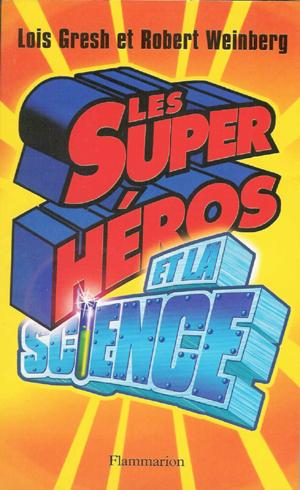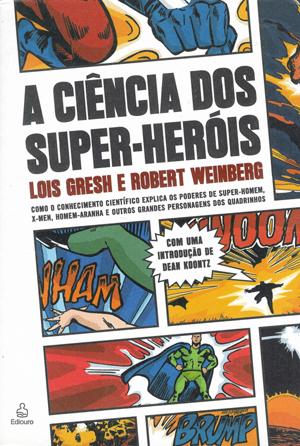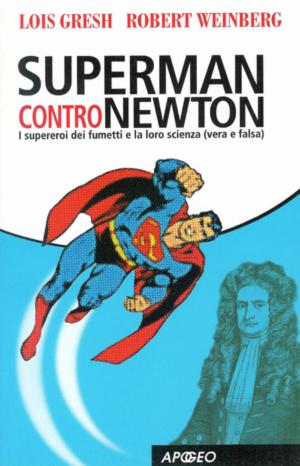The Science of Superheroes by Author Robert Weinberg
The Science of Superheroes
Robert Weinberg
SCIENCE OF SUPERHEROES Writers Win Two National Awards!
On April 11, 2003, at the Rochester Chapter Award dinner for the Society of
Technical Communications, THE SCIENCE OF SUPERHEROES by Lois H. Gresh and
Robert Weinberg won two awards in the International-Level Competition
sponsored each year by the Organization. The book received an award for
"Distinguished International-Level Merit in Technical Communications" and
also won the special "Best in Show 2003" award from the Rochester Chapter of
the Organization. This is the first time ever that a book on pop-science
and comic books has been so honored by this highly regarded professional
association.
STC is the world's largest professional association for technical
communicators. With more than 20,000 members across the globe, STC provides
unparalleled opportunities for continuing education and peer networking.
Members include every kind of technical communicator, including technical
writers, editors, and illustrators as well as Web designers, technical
translators, and managers and teachers of technical communication. They
work in industries as diverse as computer software, medicine, aviation,
manufacturing, and entertainment. STC has 150 local chapters on six
continents-- anywhere people need technical information, STC members are
there.
Ms. Gresh, a member of the Society's Rochester Chapter, attended the dinner
and was caught completely by surprise by the double honor. In her short,
impromptu, acceptance speech, she thanked the Society for the two Awards and
promised to keep up the good work, as she and Mr. Weinberg are hard at work
on their new science book, THE SCIENCE OF SUPERVILLAINS.
Now available in trade hardcover edition from John Wiley & Sons, is The Science of Superheroes written by Bob and Lois H. Gresh. For more than sixty
years, comic book superheroes such as Superman, Batman, the X-Men, the Flash and Spider-man
 have protected humanity from evil-doers while defending truth and justice. Now, Bob Weinberg and Lois Gresh have launched and amusing yet provocative investigation behind those superpowers in their book, The Science of Superheroes. Featuring an introduction by Dean Koontz, the book seeks to answer the question: science fiction or science fact.
have protected humanity from evil-doers while defending truth and justice. Now, Bob Weinberg and Lois Gresh have launched and amusing yet provocative investigation behind those superpowers in their book, The Science of Superheroes. Featuring an introduction by Dean Koontz, the book seeks to answer the question: science fiction or science fact.
Beginning with Superman, the first comic book super hero, the authors ask how can a building lifted by Superman remain in one piece? Could he actually travel faster than the speed of light? If Superman's strength is a result of the much stronger gravity on Krypton, exactly how big was Krypton? Filled with real scientific evidence, Gresh and Weinberg's findings will delight and amuse any superman fan. From there, they move onto other super characters including the Fantastic Four, the Incredible Hulk, Aquaman and the Sub-Mariner, Spiderman, the Green Lantern and many more. Concluding the book, Weinberg and Gresh ask several well-known comic writers their opinions on the science in comics.
Published at $24.95, The Science of Superheroes is available from John Wiley & Sons, Amazon.com, and bookstores throughout the United States, England, and Canada. Foreign rights have been sold in both Europe and Asia; the British Science Fiction Book Club plans to bring the book out in January. And, there's even talk of a possible movie or TV special sometime in the future.
"Fantastically hilarious" says Diamond Galleries SCOOP magazine, Nov 1, 2002
"---the book should go down well with the comics' teenage readers: the
writing is an accessible style and the authors skillfully manage the difficult gear-shift between describing the heroes and discussing the science." New Scientist, October 23-24
"Overall, the book has just the right tone -- straightforward, educational, but not too stuffy or serious. They aren't making fun of superheroes or poking holes in the stories, but using them as springboards to teach readers more about the principles behind the concepts. At the same time, they aren't bending over backwards to make the heroes "realistic" or believable; they understand that some things are done for the sake of interesting or exciting stories." Comics Worth Reading, Johanna Draper Carlson.
"What seemed impossible just sixty years ago during the Golden Age of Comics, now appears increasingly plausible. The Science of Superheroes serves as an entertaining and informative guide to comic book wonders bound to come." --Julius Schwartz, Editor Emeritus, DC Comics
"I found this book to be a hoot from beginning to end. Ms. Gresh and Mr. Weinberg must have spent some time in institutions for the deranged, because well-balanced minds could not have conceived of this project. But thank God for their derangement, for they have produced a package of pure fun from first page to last. If, like me, you admire superheroes from a distance, or if you are a hardcore fan of them, you will enjoy this book as surely as you would enjoy waking one morning to discover that you are invincible, able to fly, and in possession of a totally cool costume behind which to hide your true identity."
--Dean Koontz, from the Introduction
Go to read an
entire chapter from
The Science of Superheroes
(on Batman), as well as the entire
Dean Koontz introduction
to the book!
|
Here's how the advance publicity described this book:
"Exactly how powerful is the gravity on Krypton? Do mutants exist? If an ant's enlarged to
the size of a human, could it push over skyscrapers? What is a gamma bomb?
If you've ever wondered about these and the many, many other questions raised by super hero comics, you're in luck. The answers are all included in the new book,
The Science of Superheroes by Lois Gresh & Robert Weinberg, due from publisher John Wiley & Sons on September 13, 2002. This 224 page hardcover volume, which features a new introduction by best-selling author, Dean Koontz, will retail for $24.95 in the United States, $38.95 in Canada. The book takes a lighthearted but rigorous look at the science used in super hero and science fiction comic books, ranging from Superman to Spiderman to Strange Adventures."
The Science of Superheroes continues to sell well, in the USA, as well as
overseas.

Science of Superheroes
Japanese Edition
|

Science of Superheroes
French Edition
|

Science of Superheroes
Brazilian Edition
|

Science of Superheroes
Italian Edition
|
Table of Contents:
Introduction by Dean Koontz
A Word about General Relativity
Chapter 1. More Powerful than a Speeding Locomotive
A. The Superman Legend Begins
B. What Makes Superman Super?
C. Alien Visitors
D. The Drake Equation
E. Rare Earth?
F. A Question of Gravity
Chapter 2. Rays - Cosmic and Gamma
A. Humble Beginnings
B. A Fantastic Foursome
C. Frankenstein's Monster - Marvel Style
D. The Perils of Techno-Babble
E. The GFP Hulk
Chapter 3. A Dark Knight
A. A Non-Super Superhero
B. The Science of Batman
C. The Gotham City Earthquake
Chapter 4. Under the Sea
A. Undersea Heroes
B. Our Aquatic Ancestors?
C. Breathing under Water
D. Pressure
E. Fluid Breathing
F. Talking to Fish
Chapter 5. Along Came a Spider
A. With Great Power
B. The Power of a Spider?
C. Clones, Clones, and More Clones
Chapter 6. Green Lanterns and Black Holes
A. Magic, Science, and Two Green Lanterns
B. Wanted: An Unlimited Power Source
C. The Life and Death of Stars
D. The Origin of Black Holes
E. Yellow Light
Chapter 7. Of Atoms, Ants, and Giants
A. The Square Cubed Law
B. The Atom
C. The Atom Exploded
Chapter 8. Fast, Faster, Fastest
A. Introducing The Flash
B. Some Problems with Logic
C. The Speed Barrier
Chapter 9. Good, Evil, and Indifferent Mutants
A. A Victory Snatched from the Ashes
B. The Case for Evolution
C. The Truth About Creationism
D. Creating the X-Men
Chapter 10. Mysteries in Space: Science Fiction Superheroes
A. Super Science Without Super Heroes
B. The Secrets of Other Worlds, Exposed!
C. Doomsday on Earth
D. Across the Ages
E. The Grandfather Paradox
Chapter 11. The Right Stuff
A. The Real Deal
B. The Best Man
Appendix A. Who Missed The Cut
Appendix B. The Creators Speak
Bibliography & Superhero Reading List
Acknowledgements
The Science of Superheroes is copyright © 2002
by Robert Weinberg and Lois Gresh.
Cover art is copyright © by John Wiley & Sons.
Return to the Main Page.
 have protected humanity from evil-doers while defending truth and justice. Now, Bob Weinberg and Lois Gresh have launched and amusing yet provocative investigation behind those superpowers in their book, The Science of Superheroes. Featuring an introduction by Dean Koontz, the book seeks to answer the question: science fiction or science fact.
have protected humanity from evil-doers while defending truth and justice. Now, Bob Weinberg and Lois Gresh have launched and amusing yet provocative investigation behind those superpowers in their book, The Science of Superheroes. Featuring an introduction by Dean Koontz, the book seeks to answer the question: science fiction or science fact.



